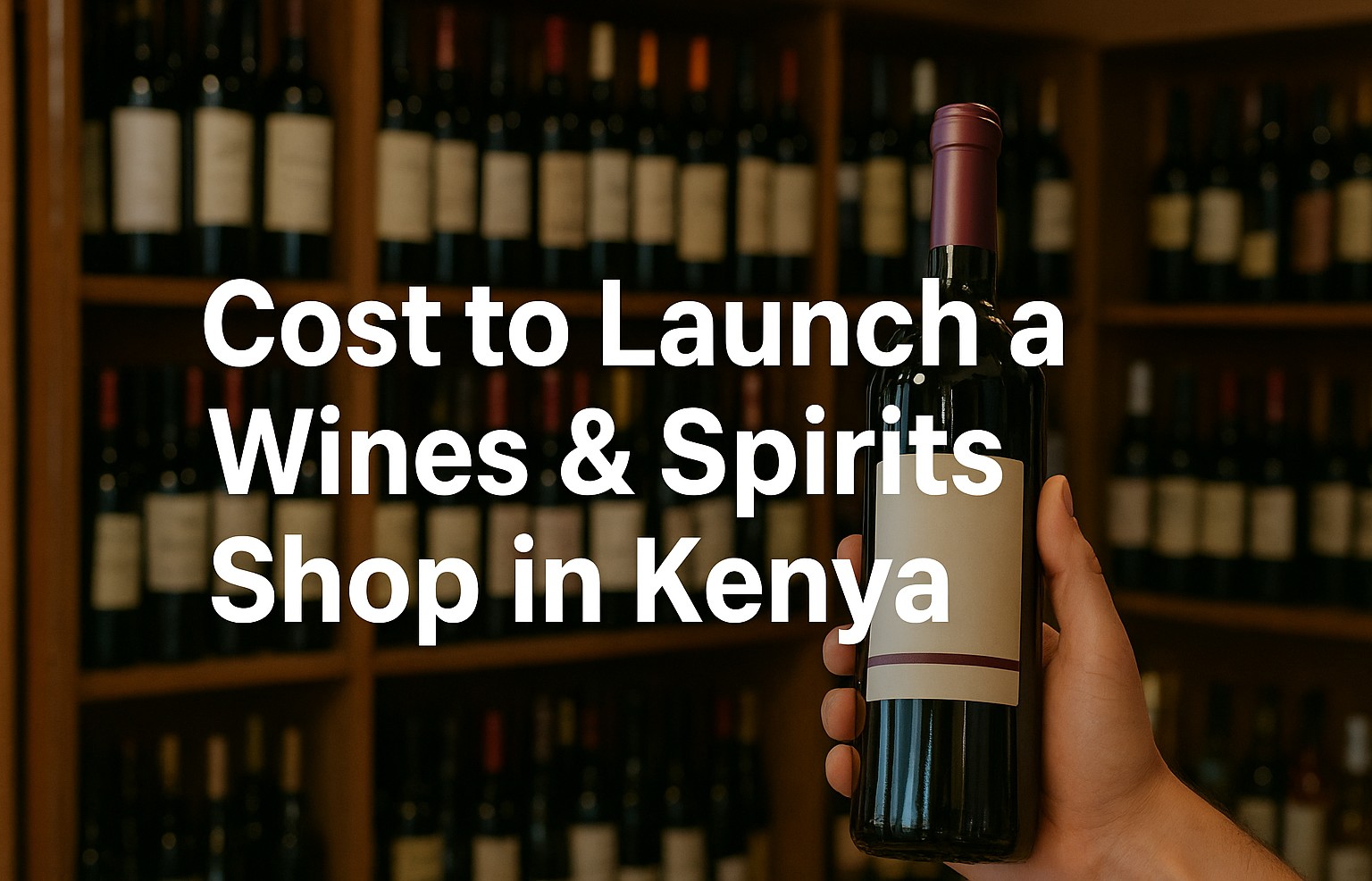

Titus Morebu
Author
Cost to Launch a Wines & Spirits Shop in Kenya: What You Really Need to Budget 💰
Estimate startup capital for a wines and spirits shop in Kenya — licensing, rent, inventory, equipment, legal compliance, and tips to optimize cost and revenue.
Thinking of starting a wines & spirits shop in Kenya? 🍷 The opportunity is real — but the regulatory, financial, and operational hurdles are also significant. In this post, you’ll find a well-researched, up-to-date breakdown of what it truly costs (and how to manage those costs wisely) in 2025.
Why Consider a Wines & Spirits Shop?
The alcoholic beverage industry in Kenya continues to grow, with rising demand for premium, craft, and imported brands. The shelf life of many wines and spirits is long, reducing losses from spoilage. And with careful planning, margins can be strong.
That said, compliance is strict. Running without proper licenses can attract fines or closure, and local and national authorities demand high accountability.
Key Cost Components
Below is a breakdown of the major cost centers you’ll want to review and plan for carefully.
1. Licensing, Permits & Legal Compliance
- Liquor / Alcoholic Drinks License: Depending on county and business type (retail “off-license” vs “on-license” or bar/pub), fees can vary. In many counties the retail wine & spirits (off-license) fee is approximately KES 24,000 annually; a general retail (bar/pub) license may cost KES 50,000. Counties may also offer waivers or reductions depending on policy. (For example, Nairobi reduced fees in 2024 from KES 100,000 down to KES 25,000 for general retail.)
- National / Import-Export License (if applicable): If you will import, export, or distribute at scale, you’ll engage with NACADA regulations and pay higher license fees based on volume. For large volumes (e.g. 500,000+ liters), fees may go up to KES 250,000 or more.
- County Business Permit / Unified Business Permit: This is your local permit to operate in your jurisdiction. The cost depends on size, location, and classification. In Nairobi, a full-fledged wine & spirits shop might incur ~ KES 26,500 in the unified permit package.
- Public Health, Fire & Environmental Certificates: Expect to obtain health inspection certificates, fire safety compliance, and possibly NEMA (environmental) approvals. Allow KES 3,000–10,000 or more depending on locality.
- Business Registration & Tax Compliance: Registering the business entity (private limited, partnership, or sole proprietor) is done via eCitizen. A limited company registration might cost ~ KES 11,000. Then you’ll register for KRA PINs, VAT, withholding taxes, etc.
- Renewals, Transfers & Late Fees: Budget for annual renewals, possible transfer fees (e.g. KES 1,000), and fines if late or noncompliant.
2. Premises & Rent
The location you choose will heavily influence your success. High foot-traffic, visibility, and ease of access are ideal. But rent in prime areas will be high.
- In urban/suburban areas, monthly rent might run between KES 20,000 and KES 50,000 or more, depending on size and area.
- Security, access, parking, and road frontage matter. These can raise rent further.
- Ensure your lease allows you to run an alcoholic-beverage business (some zones are restricted).
3. Shop Fit-Out, Equipment & Furnishing
You’ll need to invest in shelving, display racks, cold rooms (for chilled products), counters, lighting, security (CCTV, alarms), signage, point-of-sale (POS) systems, and interior décor.
- Basic shelving, display units and counters might start from KES 20,000–50,000 depending on scale.
- Refrigeration or chilled display units could cost from KES 30,000 to 100,000+ depending on size and brand.
- POS software and hardware (barcode scanners, receipt printers, cash register) might add another KES 10,000–30,000.
- Security systems (CCTV, alarm, locks) could cost KES 10,000 or more.
4. Inventory / Initial Stock
Getting your initial inventory is one of the largest cash outlays. The more brands and variety you offer, the better your market reach—but also the higher the cost and risk of dead stock.
- Depending on shop size, initial stock might range from KES 50,000 to KES 200,000 or more.
- Negotiate supplier credit, bulk discounts, or consignment where possible.
- Be cautious with slow-moving premium items early on; focus first on core, high-demand brands.
5. Staffing, Utilities & Operating Overheads
- Staff wages: Shop attendants, security personnel, store managers—budget according to prevailing wage rates.
- Utilities: Electricity (especially for cooling), water, internet, lighting—all add up.
- Insurance: Consider covering stock, liability, theft, fire. Rates may be 1–2% of stock value annually.
- Marketing & Branding: Signboards, digital marketing, promotions, POS materials.
- Logistics & Transport: Cost to bring in stock from distributors or border import shipments.
- Miscellaneous: Packaging, cleaning, security, contingencies.
Typical Total Start-Up Capital Range
The total capital requirement depends heavily on ambition, location, and scale. A modest takeaway wine & spirits shop in a suburban area might begin with KES 100,000–150,000. But a mid-sized, well-furnished shop in a premium area might need KES 250,000–400,000 or more. Some published estimates put a full setup at ~ KES 270,000. Others estimate more conservative setups at KES 70,000–300,000. Be ready for flexibility.
How to Manage & Reduce Start-Up Costs Smartly
- Start small: Launch with fewer SKUs, core brands, and limited floor space. Expand later.
- Negotiate supplier terms: Use credit, bulk orders, or consignment arrangements to lower upfront inventory cost.
- Lease equipment instead of buying: For fridges, POS systems, or security gear.
- Choose a lower-rent but growing area: A location with potential footfall, not necessarily the highest rent zone.
- Partner or share space: Co-locate in a larger shop or franchise model to split overheads.
- Phase your licenses: You may begin with basic permissions and upgrade as business grows, though full compliance is essential from day one.
- Use technology wisely: Cloud POS, inventory management software, mobile ordering can save costs and increase efficiency.
Revenue, Profit Margins & Payback Expectations
Margins in wines & spirits often vary by product category (e.g. local vs imported, premium vs standard). Some entrepreneurs report daily profits between KES 1,500 and KES 5,000, and monthly profits of KES 30,000 to KES 100,000 depending on scale. Wholesale operations often yield lower per-unit risk and steadier margins if you scale up.
With consistent performance, you may recover your initial investment within 6–18 months, depending on how aggressively you market and manage costs.
Risks & Challenges to Watch Out For
- Regulatory risk: Changing county policies or stricter enforcement can add costs or cause closures.
- Supply chain disruptions: Delays, fluctuating excise duties, or import restrictions.
- Theft & pilferage: In a product-heavy business, internal theft is a vulnerability. Metallic counters, CCTV, strong controls matter.
- High competition: Many shops compete in certain zones; differentiating your brand, customer service, or unique SKUs is key.
- Cash flow stress: The risk that stock plus overheads outpace revenue early on.
Checklist: Pre-Launch Steps
- Conduct market research: customer profiles, competing shops, demand by product category.
- Secure a location with the right zoning and permissions.
- Register your business and tax identity.
- Apply and obtain all licenses and health, fire, environmental clearances.
- Negotiate supplier relationships and test supply chains.
- Fit out your shop with shelving, display, refrigeration, security.
- Procure initial inventory and arrange logistics.
- Hire and train staff, set up systems (POS, inventory).
- Launch with a marketing push—grand opening promotions, social media, signage.
Conclusion & Final Thoughts
The wines & spirits retail business in Kenya offers strong upside, but only if you navigate regulation smartly, control costs well, and build trust with customers and suppliers. Expect to invest more than you might initially plan for back-end expenses, compliance, and contingencies.
If you plan carefully, build buffer capital, and scale sensibly, your shop can move from modest operations to a landmark retail outlet over time. And with the right positioning and customer service, it can become a stable and profitable venture.
📈 Cheers to your success in building a thriving wines & spirits shop in Kenya!
Gallery

Related Articles
3 articles
How TitoCreations Empowers Kenyan Entrepreneurs With Smart Business Systems
Discover how TitoCreations equips Kenyan entrepreneurs with profitable business ideas and modern software systems to start, manage, and scale successful ventures.

How to Start Poultry Farming in Kenya 2026: A Complete Step-by-Step Guide to Profit
Learn how to start and run a profitable poultry farm in Kenya in 2026 with up-to-date setup, costs, management, marketing, and profit strategies.

Freelancing in Kenya: How to Start With No Experience 2026
Learn how to start freelancing in Kenya with zero experience, build marketable skills, find clients, and earn KES or dollars online in 2026.